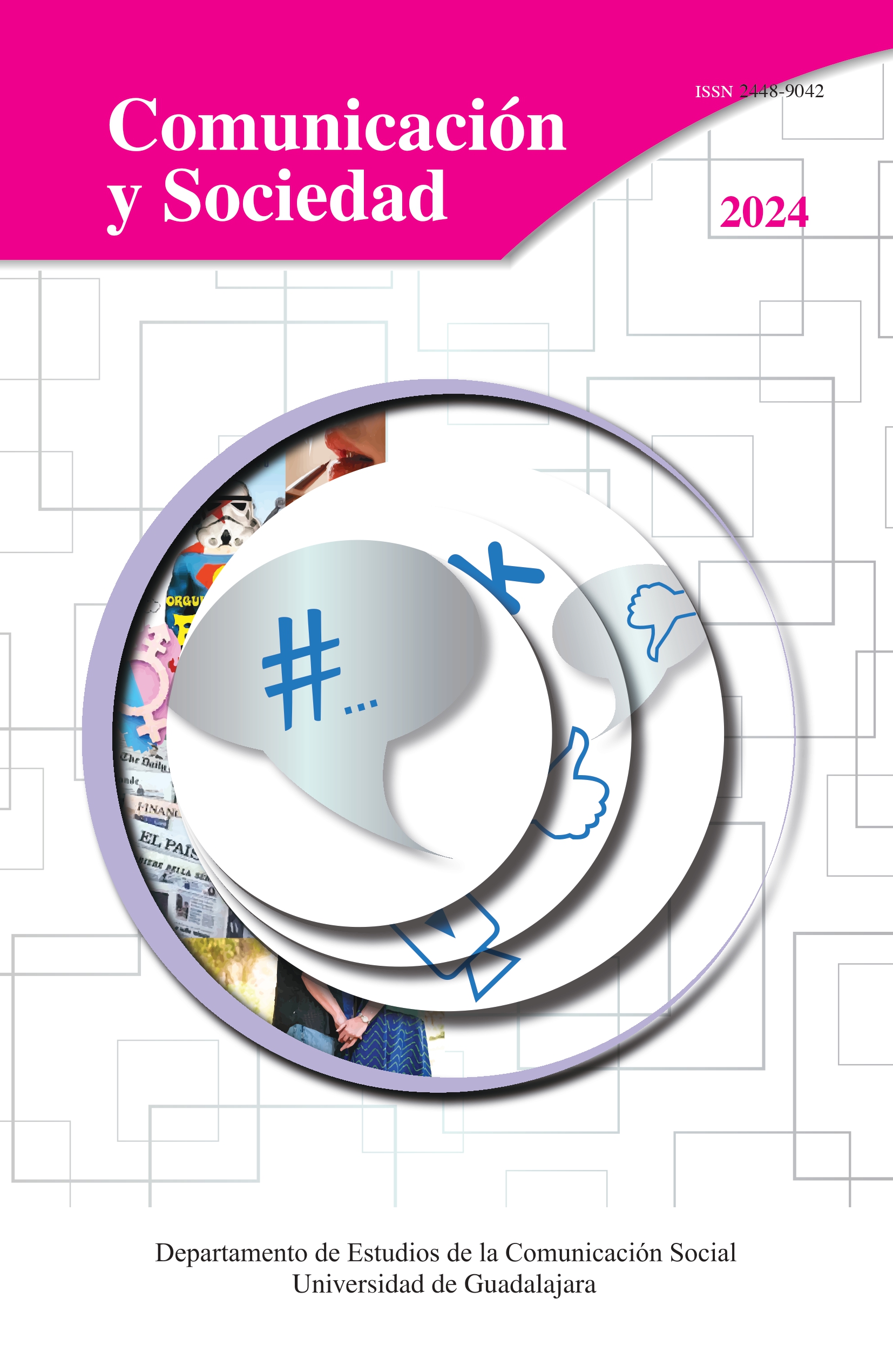El archivo digital de Humanizando la deportación: narrativas participativas como espacio tecnopolítico
DOI:
https://doi.org/10.32870/cys.v2024.8658Palabras clave:
Documental participativo, Tecnopolítica, Migración, Agencia, NarrativasResumen
Este artículo analiza el caso del archivo digital de Humanizando la deportación como espacio tecnopolítico a partir de la producción de documentales participativos. Analizamos la manera en que las experiencias de personas deportadas exponen la crueldad de violencias estructurales e institucionales sobre la migración y genera conocimiento situado para una comprensión cualitativa del tema. Discutimos cómo el documental participativo potencia la agencia de voces subalternas. Concluimos que esta plataforma se constituye como un espacio tecnopolítico a contrapelo del discurso oficial sobre la migración.Descargas
Citas
Ahmed, S. (2015). La política cultural de las emociones. Universidad Nacional Autónoma de México, pueg.
Alia, V. (2004). Media ethics and social change. Edinburgh University Press.
Allen, B., Cisneros, E. & Tellez, A. (2013). The Children Left Behind: The Impact of Parental Deportation on Mental Health. Journal of Child and Family Studies, 24, 386-392. https://doi.org/10.1007/s10826-013-9848-5
Barber, J. F. (2016). Digital storytelling: New opportunities for humanities scholarship and pedagogy. Cogent Arts & Humanities, 3(1), 1-14. http://dx.doi.org/10.1080/23311983.2016.1181037.
Boehm, D. (2017). Separated Families: Barriers to Family Reunification After Deportation. Journal on Migration and Human Security, 5(2), 401-416. https://doi.org/10.1177/233150241700500209
Burgess, J. (2006) Hearing Ordinary Voices: Cultural Studies, Vernacular Creativity and Digital Storytelling. Continuum: Journal of Media & Cultural Studies, 20(2), 201-214.
Basu, A. K., Chau, N. H. & Park, B. (2022). Rethinking border enforcement, permanent and circular migration. Economic Modelling, 108. https://doi.org/10.1016/j.econmod.2021.105733
Boccagni, P. & Baldassar, L. (2015). Emotions on the move: Mapping the emergent field of emotion and migration. Emotion, Space and Society, 16, 73-80. http://dx.doi.org/10.1016/j.emospa.2015.06.009
Cancino, J. (2022, 26 de julio). Separaciones forzadas de familias en la frontera, la huella del terror que todavía persiste. Univisión. https://www.univision.com/noticias/inmigracion/separaciones-forzadas-familias-frontera-mexico-huella-de-terror-que-persiste
Castro Ricalde, M. (2023). Deported Mothers and Their Voices in Humanizing Deportation Digital Archive: Domestic Violence and Resistances. En A. L. Sánchez Hernández, M. A. Martínez Martínez & F. Díaz Estrada (Eds.), Gender-Based Violence in Mexico. Narratives, the State and Emancipations (pp. 171-180). Routledge.
Dahlgren, P. (2006). Doing citizenship: The cultural origins of civic agency in the public sphere. European Journal of Cultural Studies, 9(3), 267-286. https://doi.org/10.1177/1367549406066073
Dreby, J. (2012). The Burden of Deportation on Children in Mexican Immigrant Families. Journal of Marriage and Family, 74(4), 829-845. https://doi.org/10.1111/j.1741-3737.2012.00989.x
Dunaway, J., Branton, R. P. & Abrajano, M. A. (2010). Agenda setting, public opinion, and the issue of immigration reform. Social Science Quarterly, 91(2), 359-378. https://doi.org/10.1111/j.1540-6237.2010.00697.x
Edwards, P. N. & Hecht, G. (2010). History and the technopolitics of identity: The case of apartheid South Africa. Journal of Southern African Studies, 36(3), 619-639.
Estrada, K. (2019) Cicatrices de separación familiar. Humanizando la deportación, 221b http://humanizandoladeportacion.ucdavis.edu/es/2019/10/25/221-cicatrices-de-separacion-familiar/
Foucault, M. (2003). The subject and power. En P. Rabinow & N. Rose (Eds.), The essential Foucault (pp. 126-144). The New Press
Fraser, N. (1992). Rethinking the Public Sphere: A contribution to the critique of actually existing democracy. En C. Calhoun (Ed.), Habermas and the public sphere (pp. 109-142). mit Press.
Golash-Boza, T. (2019). Punishment beyond the deportee: The collateral consequences of deportation. American Behavioral Scientist, 63(9), 1-21. https://doi.org/10.1177/0002764219835259
Happer, C. & Philo, G. (2013). The role of the media in the construction of public belief and social change. Journal of social and political psychology, 1(1), 321-336. https://doi.org/10.5964/jspp.v1i1.96
Haraway, D. (1988). Situated Knowledges: The Science Question in Feminism and the Privilege of Partial Perspective. Feminist Studies, 14(3), 575-599. https://doi.org/10.2307/3178066
Hiemstra, N. (2019). Detain and deport: The chaotic US immigration enforcement regime. University of Georgia Press.
Irwin, R. M. (2022). The Humanizing Deportation project: Building a community archive of migrant feelings, migrant knowledge. En R. M. Irwin, Migrant Feelings, Migrant Knowledge (pp. 3-32). University of Texas Press.
Irwin, R. M., Calvillo Vázquez, A. & Román Maldonado, Y. (2022). Approaches and Methods: Migrant Epistemologies Through Digital Storytelling. En R. M. Irwin, Migrant Feelings, Migrant Knowledge (pp. 33-63). University of Texas Press.
Kellner, D. (2001). Globalisation, Technopolitics and Revolution. Theoria: A Journal of Social and Political Theory, 98, 14-34. http://www.jstor.org/stable/41802171
Lambert, J. (2013). Digital Storytelling: Capturing Lives, Creating Community (4a ed.). Routledge.
Leetoy, S. (2011). Zelig in the jungle: Neozapatismo and the construction of the international indigenous subject. New Global Studies, 5(3), Article 1. https://doi.org/10.2202/1940-0004.1146
Leetoy, S. & Zavala-Scherer, D. (2019). Subjetividad, cotidianidad y memoria: la propuesta de documental colaborativo de José Balado. Signo y Pensamiento, 38(74). https://doi.org/10.11144/Javeriana.syp38-74.scmp
Leetoy, S., Zavala-Scherer, D. & Sierra, F. (2021). Presentación: Tecnopolítica y ciudadanía digital. Comunicación y Sociedad, 1-8. https://doi.org/10.32870/cys.v2019i0.7462
Marcuse, H. (2002). One-Dimensional Man. Routledge
Mihailidis, P. (2018). Civic media literacies: re-Imagining engagement for civic intentionality. Learning, Media and Technology, 43(2), 152-164. https://doi.org/10.1080/17439884.2018.1428623
Mohamed, H. S. & Farris, E. M. (2020) ‘Bad hombres’? An examination of identities in U.S. media coverage of immigration. Journal of Ethnic and Migration Studies, 46(1), 158-176. https://doi.org/10.1080/1369183X.2019.1574221
Morris, J. & Palazuelos, D. (2015). The Health Implications of Deportation Policy. Journal of Health Care for the Poor and Underserved, 26(2), 406-409. https://doi.org/10.1353/hpu.2015.0038
Nowrasteh, A. (2019). Deportation Rates in Historical Perspective. Cato Institute. https://www.cato.org/blog/deportation-rates-historical-perspective
Plantinga, C. (2022). Eight Theses on Emotion and Cinema. En C. Belmonte Grey & A. A. Fernández (Coords.), El paraíso de las emociones. Teoría, producción y contextos de la experiencia fílmica (pp. 23-49). Tirant Humanidades.
Pribram, E. D. & Harding, J. (2002). The power of feeling: Locating emotions in culture. European Journal of Cultural Studies, 5(4), 407-426.
Ramos Rojas, D. N. & Arreola González, B. (2022). La cobertura de las primeras caravanas de migrantes en los medios informativos mexicanos. Correspondencias & análisis, (16), 201-223. https://doi.org/10.24265/cian.2022.n16.09
Rorty, R. (1989). Contingency, irony and solidarity. Cambridge University Press.
Sánchez, G. (2017). Crueles deportaciones. Humanizando la deportación, 1. http://humanizandoladeportacion.ucdavis.edu/es/2017/05/18/crueles-deportaciones/
Sánchez de Paulsen, E. (2017). El muro separa a familias, pero jamás sentimientos. Humanizando la deportación, 4a. http://humanizandoladeportacion.ucdavis.edu/es/2017/07/13/el-muro-separa-a-familias-pero-jamas-sentimientos/
Santos, B. S. (2006). Renovar la teoría crítica y reinventar la emancipación social. clacso.
Suárez, G. (2019). 11 Meses en Guadalajara. Humanizando la deportación, 170. http://humanizandoladeportacion.ucdavis.edu/es/2019/06/14/170-11-meses-en-guadalajara/
Shklar, J. (1984). Ordinary Vices. Harvard University Press.
Tiscareño-García, E. (2021). Encuadres noticiosos sobre la Caravana Migrante del 2018 en periódicos digitales mexicanos. Estudios sobre el Mensaje Periodístico, 27(1), 281-293. https://dx.doi.org/10.5209/esmp.71436
U.S. Immigration and Customs Enforcement. (2019). Fiscal Year 2019 Enforcement and Removal Operations Report. https://www.ice.gov/sites/default/files/documents/Document/2019/eroReportFY2019.pdf
Velasco, J. (2019). Deportado por ser un espectador. Humanizando la deportación, 228. http://humanizandoladeportacion.ucdavis.edu/es/2019/12/11/228-deportado-por-ser-un-espectador/
Viola, L. & Musolff, A. (2019). Introduction. Migration and Crisis Identity. En L. Viola & A. Musolff (Eds.), Migration and Media: Discourses About Identities in Crisis (pp. 1-9). John Benjamins Publishing Company.
Descargas
Publicado
Cómo citar
Número
Sección
Licencia

Esta obra está bajo una licencia internacional Creative Commons Atribución-NoComercial 4.0.
Los autores/as que publiquen en esta revista aceptan las siguientes condiciones:
De acuerdo con la legislación de derechos de autor, los autores conservan los derechos de autoría y otorgan a Comunicación y Sociedad el derecho de primera comunicación pública de la obra. Comunicación y Sociedad no realiza cargos a los autores por enviar y procesar artículos para su publicación.
Los autores/as pueden realizar otros acuerdos contractuales independientes y adicionales para la distribución no exclusiva de la versión del artículo publicado en Comunicación y Sociedad (por ejemplo incluirlo en un repositorio institucional o publicarlo en un libro) siempre que indiquen claramente que el trabajo se publicó por primera vez en Comunicación y Sociedad.











